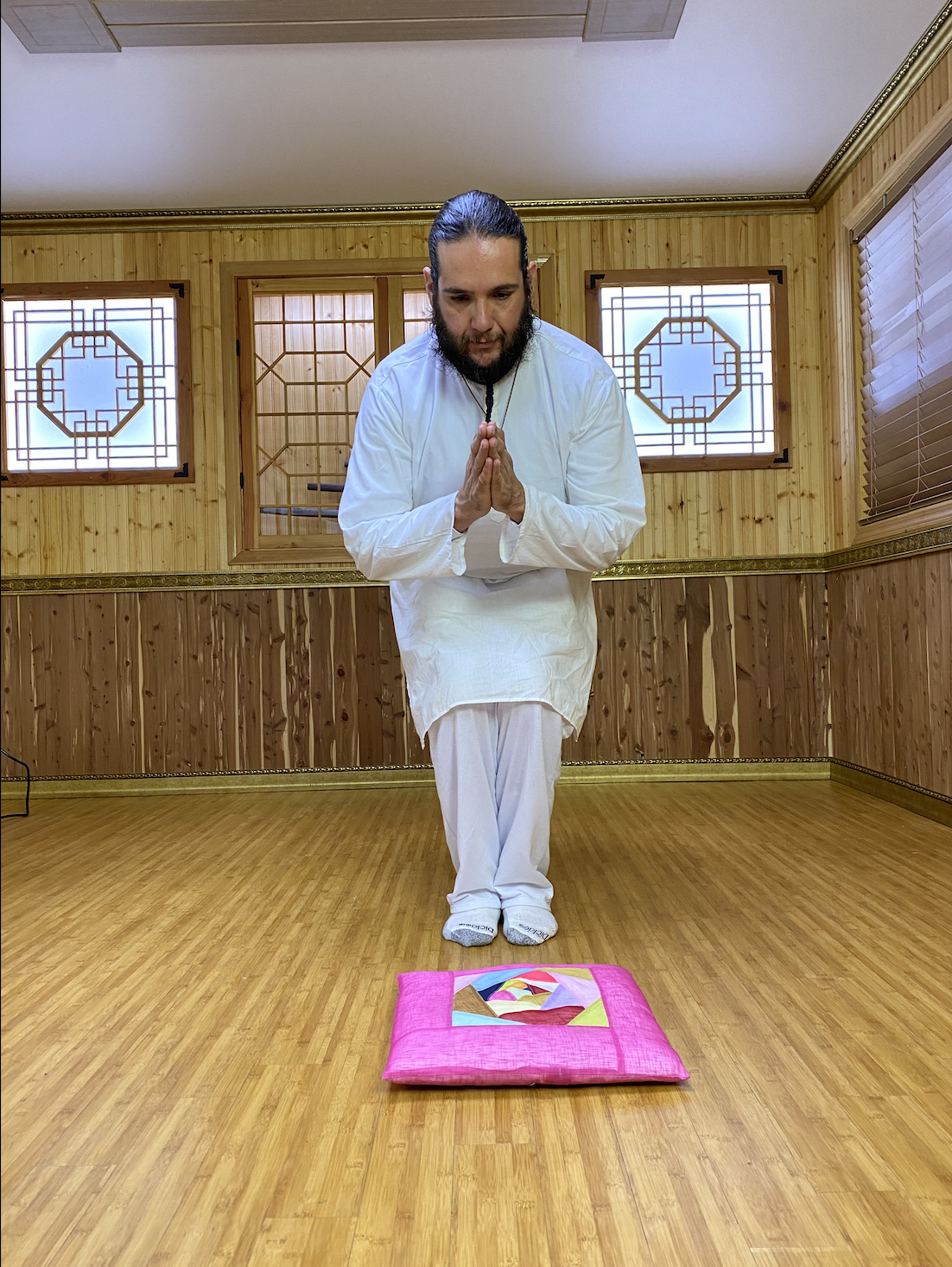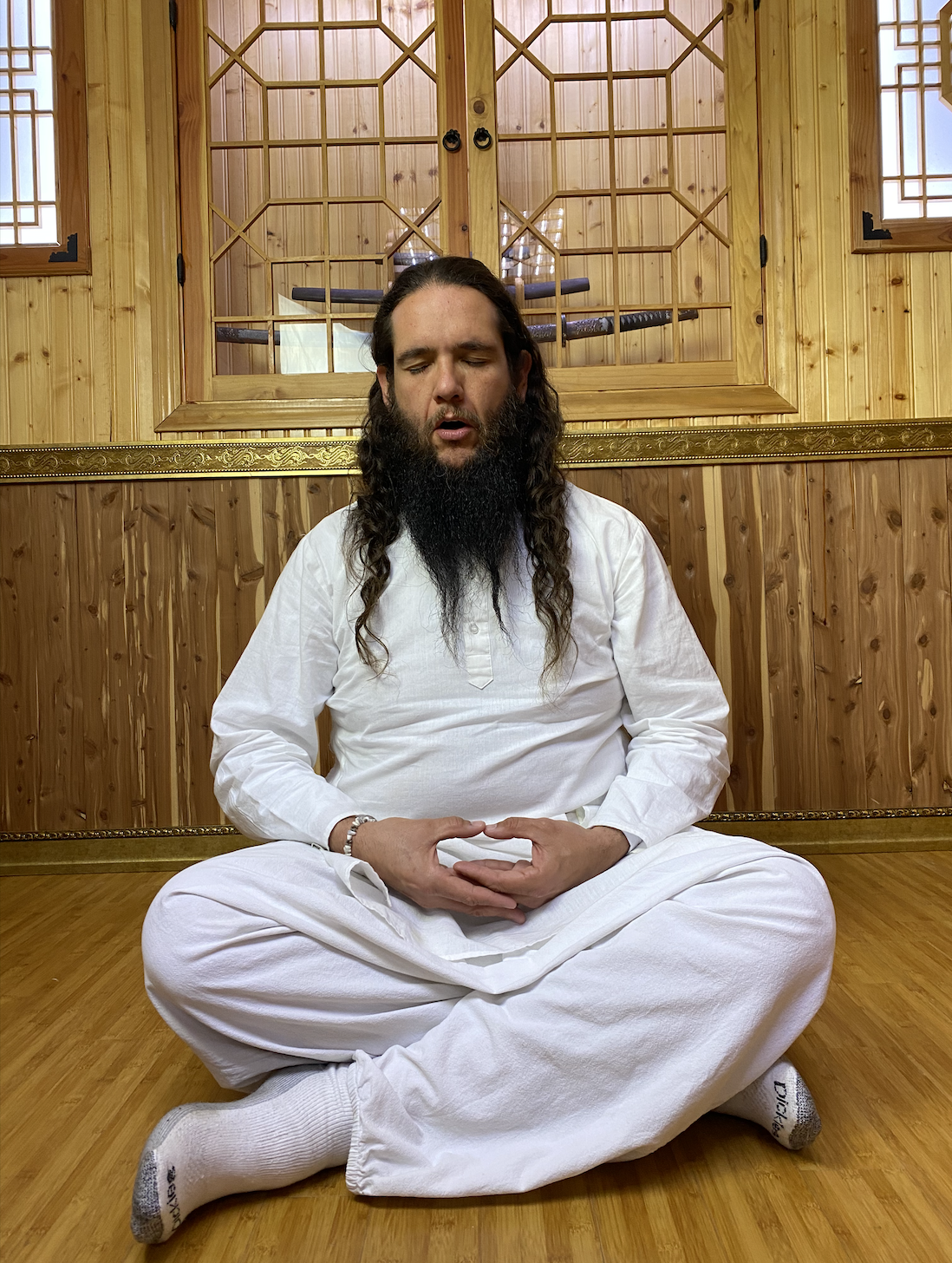
Meditation Center in Seattle Offering Classes In-person & Virtual
Health focused meditation classes in Seattle.
“Harness your health & wellbeing with meditation techniques based on Eastern herbal medicine, Sundo, Reiki & Qigong.”
Learn More About Our Meditation Techniques
Bow Meditation
Explore Bow Meditation at Bango Meditation Center in Seattle. Experience the ancient Buddhist practice of humility and mindfulness with Gon Kim.
Ohm Meditation
Discover the spiritual depth of Ohm Meditation in Seattle at Bango Meditation Center. Join Gon Kim in harnessing the primal sound of the universe.
Taegeung Ohheang Meditation
Learn Taegeung Ohheang Meditation at Seattle's Bango Meditation Center. Gon Kim guides you through this unique blend of movement and mindfulness.
“Meditation brings wisdom; lack of meditation leaves ignorance.
Know well what leads you forward and what holds you back, and choose the path that leads to wisdom.”
— Buddha
Hey Seattle! Let’s Meditate
What is Meditation?
Meditation is a simple way of freeing your mind, forgetting about daily anxieties and focusing on mental relaxation. Going into a meditative state involves learning to become a passive observer of one’s thoughts.
Meditation is the process of continuous focus on one object for a prolonged period of time. It is a gentle method which does not require any force & pressure on the mind.
Just like developing any other skill, meditation requires regularity of practice. There are common misconceptions that meditation is something difficult, which requires years of practice to achieve any kind of result. This is simply untrue.
People often report feeling the benefits of meditation immediately after their first session. You can begin today and experience it yourself with just a few steps.
How Does Meditation Help?
Reduces stress & bring peace: As you allow your mind to settle on one continuous thought, your stress level reduces. Other health problems like high blood pressure, irregular or high heartbeat, high pulse rate, abnormal breathing patterns, and anxiety also are regulated.
Helps you sleep better: Have you ever laid your head on a pillow and then struggled for hours to sleep because of thoughts racing through your mind? Meditation is ideal for you! If you practice meditation on a regular basis, you will gradually begin to cherish the present moment. Worries of the day and the future will not trouble you, allowing you to sleep soundly. When you wake up the next morning, you’ll feel fully relaxed.
Makes you emotionally stronger: How? During the meditation process, where we are constantly focusing our attention on one thing, we learn to let go of unnecessary thoughts. Meditation is a process of spending time with yourself and is a journey of self-discovery.
Keeps you active throughout the day: One who is committed to balancing their mental energies is also a lot more energized. The positivity that you develop in your mind will give you the zest and enthusiasm to maximize your productivity throughout the day.
Benefits of Meditation
How many times have you felt that 24 hours are not enough in a day? Whether you’re a student or a professional, you are trapped in this fast-moving world, where it is increasingly more difficult to find time for oneself.
Usually, when we take a break from our busy schedules, we spend time on our mobile phones or laptops. It is harmful not only for the eyes but also for the mind.
The mind is like a pendulum. It keeps swinging from one extremity to another. What we require is centeredness. To regulate the mind and give it some rest, the best medicine you can give it is meditation.
Meditation acts like a battery-recharger. Just 10 minutes of meditation will leave you feeling calm and refreshed and better able to tackle the rest of your workload.
Basic Meditation
How to Meditate for Beginners:
Here are five tips for beginners to learn how to meditate:
1) Find a quiet, peaceful place.
2) Sit comfortably, with eyes closed and focus on the heart.
3) Begin with a suggestion that the source of light is within my heart and it is attracting me inwards.
4) Meditate for 10 minutes, or until you feel ready to come out of the meditation.
5) Repeat it every day, in the morning and the evening. Incorporating this time for quiet contemplation and reflection can bring you enormous mental and physical benefits.
Integrating Qigong in Meditation:
At Bango Meditation Center in Seattle, we have pioneered a distinctive approach to meditation by integrating the ancient practice of Qigong. This harmonious blend provides a comprehensive experience that nurtures both mental and physical well-being. Led by master Gon Kim, a seasoned East Asian Medical Practitioner, our sessions are more than just meditation – they are a journey towards holistic health and inner harmony.
The Essence of Qigong:
Qigong, an ancient Chinese health care system, combines physical postures, breathing techniques, and focused intention. The word "Qigong" is composed of two Chinese characters: "Qi," meaning life force or vital energy, and "Gong," denoting skill cultivated through steady practice. Qigong's roots in Chinese medicine, philosophy, and martial arts reflect its depth and versatility as a practice for overall well-being.
Integrating Qigong in Meditation:
Energetic Alignment: Our meditation sessions begin with Qigong exercises designed to align and activate the body's energy centers or meridians. This prepares the mind and body for deeper meditation, ensuring an integrated practice.
Mindful Movements: Unlike traditional meditation practices that emphasize stillness, Qigong involves gentle, flowing movements. These movements, coordinated with breath, enhance mindfulness and help practitioners maintain focus and presence.
Breathing Techniques: Qigong emphasizes deep, diaphragmatic breathing, which is integrated into our meditation sessions. This type of breathing encourages relaxation, reduces stress, and increases oxygen flow to the brain, enhancing the meditative experience.
Meditative Postures: While some Qigong practices involve dynamic movement, others are more static and meditative. These postures, held for varying durations, are infused into our meditation sessions, combining the stillness of meditation with the subtle energy work of Qigong.
Energy Cultivation: In Qigong, energy cultivation is essential. Our meditation practices focus on harnessing and directing Qi throughout the body, promoting healing, vitality, and a sense of inner peace.
Benefits of the Combined Practice:
Enhanced Focus and Clarity: The integration of Qigong into meditation brings a unique focus that clears the mind and sharpens concentration.
Physical Health: The gentle physical exercises of Qigong improve strength, flexibility, and balance, complementing the mental and spiritual benefits of meditation.
Stress Reduction: This combined practice effectively alleviates stress, promoting a state of calm and relaxation.
Holistic Well-being: By addressing both the mind and body, our unique approach fosters a comprehensive sense of wellness and harmony.
Our Founding Principles: Sundo Buddhism & Taoism
A Unique Legacy: While yoga and other Taoist practices are widely recognized, Sundo remains a lesser-known yet profoundly impactful discipline. Originating in the secluded mountains of Korea in the 1100s, Sundo has only recently begun to emerge globally over the past five decades. At Bango Meditation Center, we're proud to bring this transformative breathwork practice to Seattle.
The Power of Sundo: Sundo, deeply rooted in Taoist principles, prioritizes harmony and balance. It's a technique that guides the body and mind towards their most natural states, promoting optimal health and self-mastery. This practice is grounded in the ancient wisdom of Taoists, who observed the effortless belly breathing of infants, recognizing the loss of this natural rhythm as we age.
Reclaiming the Breath: Sundo is more than a practice; it's a reconnection with our vital life force – our breath. In our modern, fast-paced world, the art of breathing has been undervalued, often seen as merely an automatic function. Sundo challenges this view, harnessing breathing as a powerful tool for wellness and transformation.
Sundo vs. Yoga: A Distinct Approach: While yoga integrates postures with breathing, Sundo shifts the focus, emphasizing breathing as the core of the practice. Our Sundo classes at Bango Meditation Center start with mastering deep, slow breathing techniques, setting the foundation for more advanced practices. This approach cultivates an incredible source of power for all aspects of life.
Key Differences Between Sundo and Yoga:
Movement and Stillness: Sundo involves minimal movement, allowing for greater focus on breath, unlike the more dynamic nature of yoga.
Breathing Techniques: We teach the use of nose breathing in Sundo, optimizing carbon dioxide levels, unlike the varied breathing techniques in yoga.
Smooth, Consistent Breathing: Sundo promotes seamless belly breathing, distinct from the varied stop-start breaths of yoga's Pranayama.
Addressing Obstructions: We emphasize identifying and overcoming barriers to optimal breathing, integrating self-massage and visualization.
Focus on Breath: Sundo's practice involves closed eyes during postures, minimizing distractions to concentrate solely on breathing.
Transformative Results: Practicing Sundo at our center leads to enhanced calm, mental clarity, vital energy, and overall well-being. This focus on deep, controlled breathing offers more than temporary relief – it provides lasting benefits for both body and mind.
Experience the Elixir of Life with Sundo: Sundo, a cornerstone of Taoist practices, is not just about preserving energy; it's about creating a reservoir of vitality. Join us at Bango Meditation Center in Seattle to experience the profound benefits of Sundo for yourself!
Gon Kim (Director)
Biography:
Gon Kim’s path in meditation and spiritual exploration has been deeply intertwined with that of Sundo Buddhism and Taoism, leading to the creation of Bango Meditation Center.
Career and Philosophy:
Synergistic Partnership: The collaboration between Gon Kim and Doan is rooted in a shared vision and spiritual kinship.
Embracing Secret Korean Buddhism & Taoism: Gon Kim is dedicated to the study and teaching of "secret Korean Buddhism," merging elements of Confucianism, Taoism, and Shamanism.
Founding Bango Meditation Center: Their combined expertise and experiences are the cornerstone of Bango Meditation Center, with a mission to enlighten students about the transformative power of meditation.
GV's 28 Acupuncture points are connected to the 28 acupuncture points on the Korean astronomical map, and CV's 24 points are connected to the 24 solar terms of Asia. They are all related to the sun's orbital period, and this is connected to the body and transferred to the Immaek and Dokmaek.
In breathing practice, it is important to open and connect the 3 doors and 3 centers to breathe.













